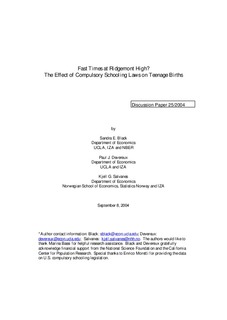| dc.contributor.author | Black, Sandra E. | |
| dc.contributor.author | Devereux, Paul J. | |
| dc.contributor.author | Salvanes, Kjell Gunnar | |
| dc.date.accessioned | 2006-08-07T07:45:37Z | |
| dc.date.available | 2006-08-07T07:45:37Z | |
| dc.date.issued | 2004-09 | |
| dc.identifier.issn | 0804-6824 | |
| dc.identifier.uri | http://hdl.handle.net/11250/162812 | |
| dc.description.abstract | Research suggests that teenage childbearing adversely affects both the outcomes of the
mothers as well as those of their children. We know that low-educated women are more
likely to have a teenage birth, but does this imply that policies that increase educational
attainment reduce early fertility? This paper investigates whether increasing mandatory
educational attainment through compulsory schooling legislation encourages women to
delay childbearing. We use variation induced by changes in compulsory schooling laws
in both the United States and Norway to estimate the effect in two very different
institutional environments. We find evidence that increased compulsory schooling does
in fact reduce the incidence of teenage childbearing in both the United States and
Norway, and these results are quite robust to various specification checks. Somewhat
surprisingly, we also find that the magnitude of these effects is quite similar in the two
countries. These results suggest that legislation aimed at improving educational
outcomes may have spillover effects onto the fertility decisions of teenagers. | en |
| dc.format.extent | 113100 bytes | |
| dc.format.mimetype | application/pdf | |
| dc.language.iso | eng | en |
| dc.publisher | Norwegian School of Economics and Business Administration. Department of Economics | en |
| dc.relation.ispartofseries | Discussion paper | en |
| dc.relation.ispartofseries | 2004:25 | en |
| dc.subject | teenage childbearing | en |
| dc.subject | education | en |
| dc.subject | educational reform | en |
| dc.title | Fast times at Ridgemont High? : the effect of compulsory schooling laws on teenage births | en |
| dc.type | Working paper | en |
